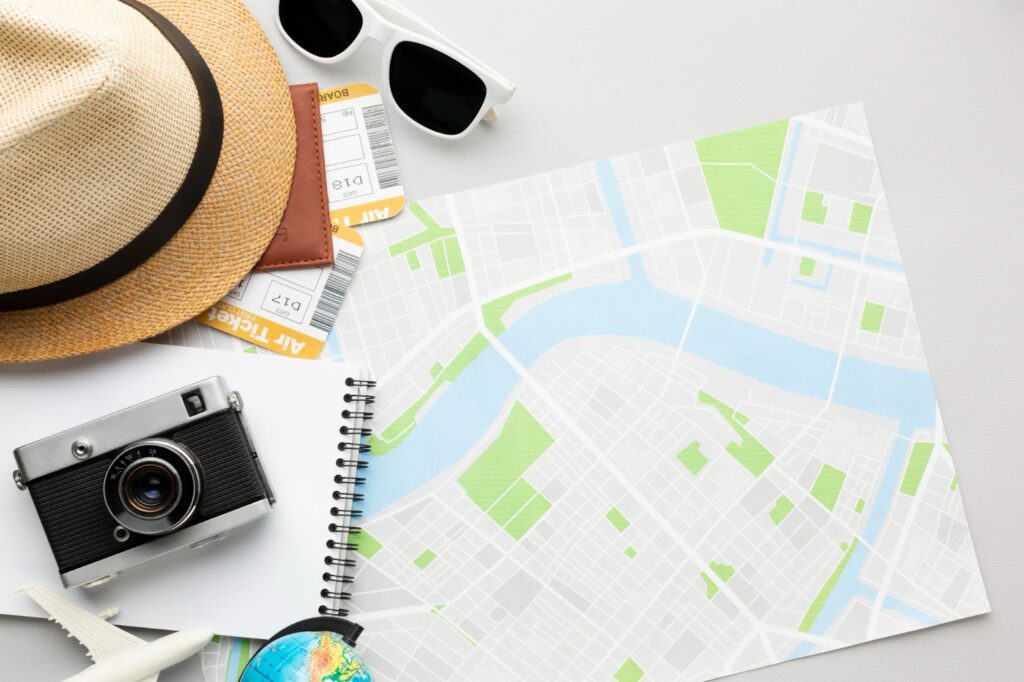Discovering Thrifty Travel Strategies: Budget Travel Tips
Embarking on adventures to distant and captivating destinations doesn’t necessarily require a hefty sum of money, and winning the lottery is not a prerequisite for global travel or pursuing studies abroad. The key lies in mastering the art of managing your expenses wisely. Here are several well-proven strategies we’ve gathered to assist you in organizing an economical vacation.
Plotting Your Path: Budget Travel Requires Strategy
Traveling without a plan can be thrilling, but it often comes with the potential for skyrocketing costs. To truly maximize the value of your travel funds, creating a strategy for your journey is a must. It’s not about having a rigid, minute-by-minute schedule — it’s about informed decision-making that can lead to substantial savings.
Here are a few points to consider when plotting your travel strategy:
- Destination Duration: Determine the length of your stay in each destination. This can help in budgeting and avoiding the stress of last-minute planning;
- Travel Route: Know the trail of your adventure. Being aware of your route not only aids in transportation planning but also in understanding the cost implications of your geographical movements;
- Spontaneity vs Savings: While spontaneous travel can be exciting, it often comes at a high cost. Unplanned last-minute flights and accommodation can quickly eat into your budget. Prepare and book in advance to get the best deals.
By planning, you’re not restricting your travel experience. Rather, you’re ensuring a more relaxed, budget-friendly journey. Having a plan can provide a backbone for your adventure, leaving you free to explore without the burden of financial stress.
Craft a Detailed Travel Blueprint
While the notion of spur-of-the-moment travel may seem romantic and adventurous, it is not particularly practical or budget-friendly. Rather than leaving everything to chance, craft a meticulous yet flexible travel blueprint. Such a framework will allow travelers to have a clear idea of their journey’s trajectory while permitting enough room for surprises and spontaneous decisions.
Creating a travel blueprint does not mean scheduling each minute of the trip—far from it. The concept revolves around understanding and planning the broader strokes of the journey:
- Travel Duration: Allocate the time you intend to spend in each city or country. This allows for better financial and logistical planning;
- Travel Route: Determine the route your journey will take. This aids in understanding the sequence of your travel and the potential costs associated;
- Spontaneity Budget: Assign a budget for unplanned activities. This will ensure that you indulge in spontaneous adventures without straying far from your financial constraints.
Remember, last-minute bookings for flights and accommodations can be significantly expensive. Hence, a detailed plan can help mitigate such unexpected expenses.
Embrace the Charm of Off-peak Travel
Peak travel seasons—usually coinciding with school holidays—are synonymous with hiked prices in the travel industry. Families bound by the school calendar often have no choice but to travel during these times. However, budget travelers can take advantage of off-peak periods, known as the ‘shoulder season’.
Traveling right before or after peak times can result in significant savings:
- Pricing: During shoulder seasons, airlines and hotels lower their prices to draw customers, translating into substantial savings for travelers;
- Experience: While the weather might not be as perfect as during the peak season, it is often still pleasant enough for an enjoyable trip. Plus, fewer crowds mean a more laid-back and enjoyable vacation.
Research is key when planning a shoulder season trip. Ensure to study the best times to visit the intended destination and plan your itinerary around it.
Explore Smart Accommodation Options
Luxury hotel suites might be glamorous, but they can also cause a significant dent in your travel budget. Instead, embrace the charm of shared dormitory rooms in hostels. Not only could this split the accommodation cost, but it also offers a chance to connect with like-minded travelers. Here’s how to be clever with your lodging choices:
- Hostels: These are budget-friendly and great for meeting fellow travelers. Many hostels also offer private rooms if dormitories aren’t your style;
- Home-sharing Sites: Platforms like Airbnb and Couchsurfing are excellent alternatives. You can rent a local’s spare room or even an entire home, often at a fraction of hotel costs. Plus, you’ll gain unique insights into local life;
- Network Accommodation: Consider reaching out to your global network of friends and family. Staying with someone you know not only cuts costs but could also offer a unique traveling experience.
Remember, your host can be a valuable source of local knowledge, from unmissable eateries to hidden tourist gems within their neighborhood.
Master the Art of Packing
Smart packing is a vital skill for any budget-conscious traveler. The goal is to include everything needed for the trip while avoiding unnecessary items that might lead to extra shopping at your destination. Here are some essential tips:
- All-Weather Clothing: Regardless of your destination, pack at least one pair of long jeans, a warm hoodie, and a waterproof jacket for unpredicted weather changes;
- Leave Room for Souvenirs: Plan your packing to accommodate any keepsakes you might pick up during your travels;
- Refer to Guides: Utilize packing guides and checklists — they offer comprehensive advice tailored to various kinds of trips and can be immensely useful.
Bear in mind, packing appropriately can not only save money but can also avoid the inconvenience and stress of finding needed items in a foreign location.
Secure Flights Early for Better Deals
A golden rule for budget travel is to secure your flights as early as possible. Airlines tend to ‘release’ their flight seats up to a year ahead, and prices generally rise the closer to the departure date you book. This is particularly true in the final month before departure.
Ensuring a return ticket not only helps you avoid being stranded due to a budget crunch but also often provides better deals than two one-way tickets. Keep these points in mind:
- Advance Booking: Book your flights early to avail lower prices. Monitor prices regularly for the best deals;
- Returns over One-Way: A return ticket often costs less than two one-way tickets. Plus, it gives you peace of mind with a guaranteed return trip.
Fly Smart: Timing and Class Matter
When, how, and where you fly can significantly impact your trip cost. Midweek flights, particularly on Tuesdays, are usually cheaper than weekend ones. This is because airlines often add a premium to weekend flights. You’re also likely to encounter shorter lines at the airport on weekdays.
Regarding flight class, while business class might appear tempting, sticking to economy allows for considerable savings. These saved funds can be better used during your trip for food or lodging.
Here are some flight tips to consider:
- Midweek Over Weekend: If possible, book your flights for a Tuesday or a midweek date to get cheaper rates and avoid airport rush;
- Economy Class: Stick to economy class. The saved money can be better utilized during your trip;
- Low-Cost Airlines: For shorter flights, consider low-cost, budget airlines. They often provide great deals;
- Hand Luggage: Especially for weekend trips, try to travel light using only carry-on luggage. This can save you money on checked luggage fees.
Remember, every dollar saved on flights is another one that can be spent exploring your destination. The key is to be flexible, plan ahead, and make smart choices.
Harness the Power of Public Transportation
Choosing buses and trains instead of planes for intra-country commuting can result in significant savings. Furthermore, using local public transportation can provide an immersive experience of the place you’re visiting, granting insight into the local lifestyle, culture, and people.

Overnight train or bus trips come with the added benefit of eliminating one night’s accommodation costs. Here are some points to keep in mind:
- Connectivity: Check the local public transport connectivity and easy reach to major tourist spots;
- Passes: Look for daily, weekly, or tourist passes, which are often cheaper than individual tickets;
- Overnight Trips: Consider overnight bus or train journeys to save on one night’s accommodation cost.
Eat Smart, Save More
Experiencing local cuisine is certainly one of the highlights of travel, but it doesn’t have to break the bank. Here are some tips to savor the local flavors without straining your budget:
- Supermarkets & Local Markets: These are treasure troves for affordable, fresh, and local food. Perfect for a budget-friendly picnic or snack;
- Restaurant Selection: Don’t rush into the first restaurant you see; take your time to compare prices and options;
- Drink Choices: While enjoying local brews can be part of the experience, having water sometimes can save you money and keep you hydrated;
- Self-Cooking: If your accommodation has kitchen access, consider cooking your own meals occasionally. It’s not only cheaper but can also be a fun and rewarding experience.
Remember, part of the adventure is finding unique, local food experiences that don’t require a high-end restaurant’s price tag. Be open to street food and local eateries—they often offer the most authentic and affordable eating experiences.
Make Travel a Revenue Stream
Traveling doesn’t just have to be about spending. You can earn while exploring the world, making it a sustainable lifestyle rather than a short-term adventure. This can be done in various ways, from seasonal work to freelancing, where you can be location-independent and work from anywhere. Here are some methods to consider:
- Seasonal Work: This can include jobs like ski instruction in winter or working in resorts during the summer. This way, you’ll not only earn money but also enjoy the location’s attractions;
- Teach a Language: If you are proficient in a second language, consider teaching it to locals. English is particularly in high demand in many regions like Southeast Asia;
- Freelance Work: With the rise of digital nomadism, you can take your skills on the road. Be it writing, graphic designing, digital marketing, or programming, there’s a wide range of jobs you can do remotely;
- Tour Guide: If you’re staying long enough in a place, becoming a local tour guide can be a great way to earn money and gain deep knowledge about the location.
While these methods can provide substantial income, remember that work regulations vary by country. Make sure to check visa requirements and work permits before engaging in paid work in any foreign country.
Seek Out Free Activities
Every destination has an array of free activities to experience. From park visits to free walking tours, museums, and local festivals, there are always ways to explore without spending a dime. Here are some free experiences you should look for:
- Free Walking Tours: These are available in many cities around the world and can be a fantastic introduction to a new place;
- Museums: Many museums offer free entry on specific days or times. Some are always free;
- Natural Attractions: Parks, beaches, and hiking trails offer endless hours of entertainment at no cost;
- Local Events: Check for local events or festivals happening during your travel dates. These can often provide a unique cultural experience.
These free activities not only keep your budget intact but can also provide a more authentic and local experience of your travel destination. Always research ahead and keep a tab on local event calendars to take full advantage of what’s on offer.
Conclusion
In conclusion, with these proven strategies at your disposal, you can now embark on exciting adventures and travel to exotic destinations without breaking the bank. By managing your expenses wisely and making use of budget-friendly tips, you can make your travel dreams a reality without needing a large budget or relying on luck. Happy travels!
